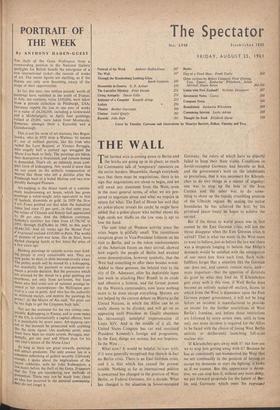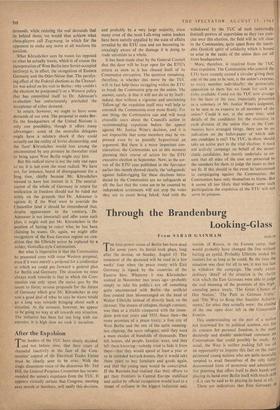THE WALL
TRE barbed wire is coming down in Berlin and the bricks are going up in its place; so much for Communist talk of 'temporary' measures on the sector borders. Meanwhile, though everybody says that there must be negotiations, there is no sign that negotiations are about to begin, and we still await any statement from the West,- even in the most general terms, of what we are pre- pared to negotiate about and what we require in return for what. The Earl of Home has said that no poker-player reveals his cards; he might have added that a poker-player who neither shows his high cards nor bluffs on the low ones is apt to lose the hand.
The sum total of Western activity since the crisis began is pitifully small. The tumUltuous reception given to Vice-President Johnson on his visit to Berlin, and to the token reinforcements of the American forces on their arrival, showed how eagerly the people of Berlin had awaited some demonstration, however symbolic, that the West had something to offer them besides words. Added to these gestures, the belated visit to the city of Dr. Adenauer, after his deplorable lapse last week in attacking Herr Brandt in So crude and offensive a fashion, and the formal protest by the Western commanders, now leave nothing more to be done except everything. Matters are not helped by the current debate on Bizerta at the United Nations, in which the Allies can be so easily shown to be divided, and will go on so appearing until President de Gaulle abandons his increasingly unhelpful impersonation of Louis XIV. And in the middle of it all, the United States Congress has cut and restricted President Kennedy's foreign aid programme. In the East, things are serious, but not hopeless. In the West . . .
What now? It would be helpful, to start with, if it were generally recognised that there,is in fact no Berlin crisis. There is an East German crisis, and it is that which has caused the present trouble. Nothing as far as international politics is concerned has changed in the position of West Berlin, or Federal Germany, for a decade. What has changed is the situation in Soviet-occupied Germany, the rulers of which have so abjectly failed to keep their State viable. Conditions in Soviet-occupied Germany had become so bad, and the government's hold on the inhabitants so precarious, that it was necessary for Khrush- chev to do two things as a matter of urgency; one was to stop up the hole in the Iron Curtain /and the other was to do some- thing to shore up the rapidly crumbling position of the Ulbricht regime. By sealing the sector boundaries he has achieved the first; by his promised peace treaty he hopes to achieve the second.
But if the threat to world peace was in fact caused by the East German crisis, will not the threat disappear when the East German crisis is solved? That is what too many in the WeSt seem to want to believe, just as before the last war there was a desperate longing to believe that Hitler's demands would be satisfied with the subjugation of one more free State each time. Such wish- fulfillers forget that a situation like the German one does not, and cannot, remain static, and— more important—that the appetites of dictators do grow by what they feed on. If Khrushchev gets away with it this time, if West Berlin does become an entirely sealed-off enclave, access to which from the West is dependent upon the East German puppet government, it will not be long before an incident is manufactured to provide an excuse for the further restrictions of West Berlin's freedom, and before those restrictions are followed by more severe ones, until in time only one more incident is required for the Allies to be faced with the choice of losing West Berlin entirely or deliberately launching full-scale nuclear war.
'If Khrushchev gets away with it': but how are we to stop him getting away with it? Because he has so consistently out-manoeuvred the West that we are continually in the position of having to accept his demands or start the fighting, it looks as if we cannot. But this appearance is decep- tive; we can stop him if, without any more delay, we put forward proposals for the future of Ber- lin and Germany which meet his expressed demands, while, resisting the real demands that lie behind them; we would thus achieve what chess-players call Zugzwang, in which for the opponent to make any move at all weakens his position.
What Khrushchev says he wants (as opposed to what he actually wants, which is of course the incorporation of West Berlin into Soviet-occupied territory) is, in effect, the recognition of Eastern Germany and the Oder-Neisse line. The paralys- ing effect of the Federal elections as the Chancel- lor was asked on his visit to Berlin : why couldn't the elections be postponed?) on a Western policy that has committed itself to Dr. Adenauer's re-election has unfortunately precluded the acceptance of either demand.
In return, however, we ought to have some demands of our own. The proposal to make Ber- lin the headquarters of the United Nations is only one possibility, though it offers many advantages: some of the neutralist delegates might have a salutary shock if they could actually see the reality of Soviet dictatorship, and the `face' Khrushchev would lose among the uncommitted by any pressure he thereafter tried to bring upon West Berlin might stay him.
But this radical move is not the only one open to us; it is not even the most radical. We have not, for instance, heard of disengagement for a long time, chiefly because Mr. Khrushchev seemed to have lost interest in it. The neutral- isation of the whole of Germany in return for unification in freedom should not be ruled out solely on the grounds that Dr. Adenauer is against it; if the West were to override the Chancellor (and it should be remembered that, despite appearances to the contrary, Dr. Adenauer is not immortal) and offer some such plan, it might well put Mr. Khrushchev in the position of having to reject what he has been claiming he wants. Or, again, we might offer recognition of the East German regime on con- dition that the Ulbricht terror be replaced by a milder, Gomulka-style Communism.
But what is imperative is that the Communists be presented soon with some Western proposal, even if it were merely a proposal for a conference at which we could put forward a general plan for Berlin and Germany. The situation we must always work towards is that in which the Com- munists can only upset the status quo by the resort to force; serious proposals-for the future of Germany which give Mr. Khrushchev at any rate a good deal of what he says he wants would go a long way towards bringing about such a situation. At the moment, however, we appear to be going no way at all towards any situation. The initiative has been for too long with our enemies; it is high time we took it ourselves.































 Previous page
Previous page